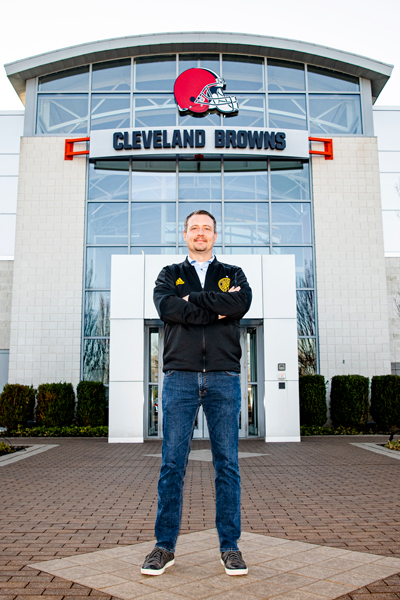|
Getting your Trinity Audio player ready... |
If there was any benefit from the pandemic era, it might be seen at FirstEnergy Stadium, home of the Cleveland Browns. During the 2020-2021 season, when in-stadium attendance was limited to 12,000 people (about 18 percent of capacity), it was the moment for the team’s IT folks to test out advanced technologies that enhance the fan experience—not just at football games, but if all goes well, for anyone attending large sports and entertainment events in the future.
Brandon Covert, vice president of IT for the Cleveland Browns, is pretty enthusiastic about those technologies and what they can do. One is Evolv Express, which is a touchless security screening system that greatly speeds up the stadium ingress process (i.e., more than 90 percent of ticket holders do not need an individual check). The second platform, Wicket, uses facial recognition in place of digital tickets for entry, and in a future date it could also replace cash and cards for concession transactions.
These are game-changing technologies to be sure. But it was because of reduced Covid-era game attendance that the organization was able to test them under real game-day conditions on a small scale. From that experience, Covert’s IT crew was able to see the possibilities of its post-pandemic implementation.
So how would the fans respond? Does this conjure privacy concerns that might be off-putting? And how did that work in 2020, when facemasks were required of all attendees?

Those were questions the team had to answer for Haslam Sports Group, which among its entities includes ownership of the Cleveland Browns and operating rights to Major League Soccer’s Columbus Crew SC. “This took a willingness to be leaders,” says Covert, adding that the technologies will also be employed at the New Crew Stadium, the 20,000-seat home to for Crew SC that was completed in the summer of 2021.
Approval of this, particularly the facial recognition component, was ultimately up to the football and soccer fans.
But the technologies had almost zero sports stadium experience to draw from so Haslam Sports Group embraced the opportunity to run a pilot program. They sent an email invitation to ticket holders, expecting perhaps a couple hundred would opt in. About eight hundred fans signed up—more than enough for a solid first season test.
“I was at the gates the first time we used it,” Covert says. “You could see the excitement on their faces, never having to pull out their phones to show an electronic ticket. It was like they were saying, ‘That’s it?’”
The Evolv Express touchless security checkpoint system is hardly visible to the person entering the stadium other than if they pass through two columns similar to those used in airports and retail stores. Each person is scanned by this technology, which is sensitive to the thickness, density, and shape of objects. This distinguishes car keys and steel-toe shoes from prohibited items, including nonmetallic objects of interest.
“Ticketing was always a bottleneck, in addition to security checks of bags and pockets. The fastest entry is the most frictionless entry.”
Brandon Covert
Each station is capable of handling 3,600 people per hour (one person per second), and it also identifies individuals, the object, and location on them that will require a closer inspection.
The faster means of entry with the combination of Evolve and Wicket is a huge selling point. “Whether it’s twenty thousand or one hundred thousand people, a surge of fans often arrive about fifteen minutes before the game or event starts,” Covert says. “Ticketing was always a bottleneck, in addition to security checks of bags and pockets. The fastest entry is the most frictionless entry.”
Covert and Haslam Sports Group’s management knew they were entering brave new world territory with the technologies, particularly with the biometric information links to concessions transactions expected in a later phase. The organization made a commitment from the start to keep all such data private and protected—property of the organization and not for sale. That promise is in both the fine print as well as boldly stated in communications to ticket purchasers who opt in.
During the pandemic, ticket purchasers electing to participate in the Wicket test submitted two photos, one with a facemask on and the second without. “This was a big concern,” Covert says. “But we had zero false positives in the first year.” The payment system application, allowing a fan to purchase food and beverages, will be rolled out when facemasks are not as prominent.
Covert is the right person to introduce these kinds of new technologies. He cut his teeth on Y2K programs at the turn of the millennium, and after consulting on IT and cybersecurity for banks and hospitals, he was hired into the Cleveland Browns organization. He finds that working in the sports industry allows business agility.
“Sports is a competitive business, like any others,” he shares. “But the ownership structure supports what we do in the interest of fans. They are customers, just the same as banks and hospitals.”

Thoughts from Guest Editor Tasker Generes
Truly a great article showing how innovative seamless game day experiences really raise the bar. It is all about the experience, whether it is a frictionless entry or the ease of purchasing concessions. Customers are customers, as Brandon Covert states, whether it is banking, healthcare, sports, or some other industry. By creating a fan experience that focuses on removing complexity, you make it easier for all involved to provide and access the services they want, all the while increasing productivity, profits, and customer satisfaction!
—Tasker Generes, Global Head of Strategy & Transformation, ServiceNow
Axess is extremely excited to be partnering with The Haslam Group at the new Columbus Crew Stadium on contactless access control technology. Brandon Covert is known to be an industry technology leader and an out of the box thinker. Working with the Crew team on delivering next generation contactless access solutions for their new stadium is very exciting, as is getting to partner with Wicket and Evolve to deliver an innovative integrated facial recognition and security checking solution.
Wicket is a software company that develops facial authentication solutions for ticketing, payments, access control, and crowd measurement, allowing live venues to deliver a touchless, speedy, and safe guest experience. The Wicket Platform integrates seamlessly into existing infrastructure allowing guests and staff to use their face as their credential, and crowd measurement to ensure social distance compliance.

